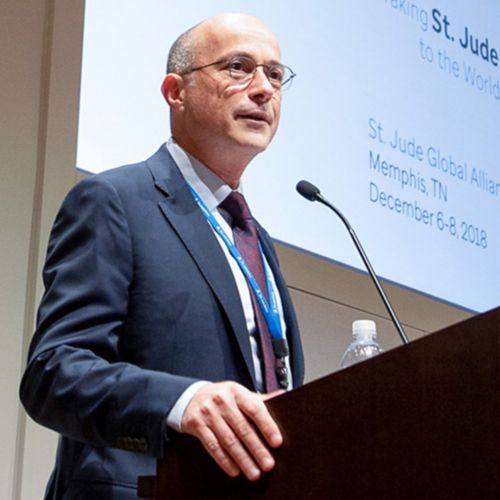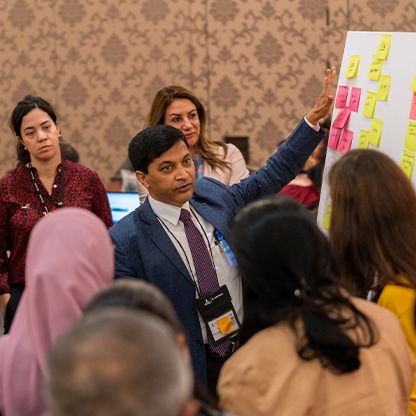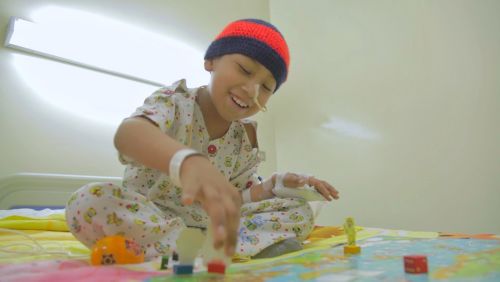St. Jude Family of Websites
Explore our cutting edge research, world-class patient care, career opportunities and more.
St. Jude Children's Research Hospital Home

- Fundraising
St. Jude Family of Websites
Explore our cutting edge research, world-class patient care, career opportunities and more.
St. Jude Children's Research Hospital Home

- Fundraising
Global Scholars: Dr. Alhassan Abdul-Mumin
Other Global Scholars Projects:
Lessons from Global Scholars Program help Dr. Abdul-Mumin bring change to Ghana
The assignment came in the second year of the Global Scholars Program. The ask: Write a brief to persuade policymakers to address a problem that affects children globally or in your own country.
For Dr. Alhassan Abdul-Mumin, head of the Department of Pediatrics and Child Health at two institutions in Ghana, the assignment quickly brought to mind the issue of prescription medications for newborns with febrile illness.
The problem in Ghana, he says, has been that some smaller facilities at the primary health care level aren’t reimbursed by the National Health Insurance Scheme for some prescription drugs used to treat newborns with these conditions. So the facilities tend to refer these patients to higher levels of the health care system without first starting treatment. This can adversely affect outcomes, especially since some families must travel considerable distances to reach that next-level facility.
Working alongside Yusuf Danasabe Jobbi, his Global Scholars colleague from Nigeria, Dr. Abdul-Mumin set out to write a policy brief to address the issue.

"There is a high burden of disease around here (in Ghana), and there are very few qualified practitioners who cater to the needs of this group. And that’s one of the other reasons why I thought being a pediatrician would be good.” — Dr. Alhassan Abdul-Mumin
But a funny thing happened before they finished. Dr. Abdul-Mumin found himself on a platform with heath managers from the Ghana health service. Relying on the work he had already done on the brief and the skills he had developed through the Global Scholars Program (for instance, crafting an elevator pitch), he was able to open a dialogue about the issue. The leaders proved receptive and, after discussions with the country’s national health insurance authority, they agreed to expand access to the medications the next time they revised their guidelines.
And that wasn’t all. “They actually agreed to have an interim measure until their next revision,” Dr. Abdul-Mumin says. “So I thought this was an advocacy issue that, if I had never … [attended] the program at St. Jude, I may not have sharpened that skill to be able to do that.”
In fact, sharpening his skills to broaden his impact was one of the driving forces behind Dr. Abdul-Mumin’s decision to join the Global Scholars Program — although, to be fair, his impact on the ground in Ghana was already quite broad.
Dr. Abdul-Mumin supports two institutions in Tamale, in the northern region of Ghana. He is an associate professor at the School of Medicine at the University for Development Studies. He also works as a consultant pediatrician with the affiliated Tamale Teaching Hospital. And he leads the Department of Pediatrics and Child Health at both institutions.
Dr. Abdul-Mumin oversees undergraduate pediatric training for medical school students as well as in-service training for junior doctors, nurses, and other allied health staff. He works to build collaborations and to secure funding for research. He is also an expert in specialist care, with a particular focus, right now, on in-patient care for newborns.
“Even before graduation from medical school, I was more inclined to be a physician than a surgeon,” he says. “… I was actually torn between being an adult physician or being a pediatrician. But then, when I considered the options at the time, I realized one of the things that was a pull factor toward pediatric medicine was that, for many of the illnesses that we have in children, you take care of them, and children grow out of their problems at some point. And this was, for me, a better option than following people until the end of life.”
He also saw the need.
“Of course, the second thing was that children are so many in Ghana and in many other low- and middle-income countries. A quarter of the population generally is youth under 18 years,” he says. “There is a high burden of disease around here, and there are very few qualified practitioners who cater to the needs of this group. And that’s one of the other reasons why I thought being a pediatrician would be good — not just for me, but for the system in which I planned to work.”
As he stood up to address the need, he was certainly no stranger to challenges, whether it was securing the scholarship that enabled him to study medicine in the first place, or the challenges that awaited him in his first year of medical school in Turkey.
“That was the first time that I ever left the shores of Ghana, and I was not even 20,” he remembers. “We went into an environment where most of the people did not understand our language, because most of the people in Turkey do not speak English. And you don’t speak Turkish — [so] you now have to start learning Turkish, and then we had to do that within six months and use that to study medicine.”
Dr. Abdul-Mumin learned later that it’s not uncommon for students from outside Turkey to fail classes in their first year as they try to learn a new language at the same time.
There were cultural differences to navigate as well. “The weather is cold. … Food is different,” he says, with a laugh. “So initially, it was very difficult. But I think I got adapted quite easily — I mean, maybe easier than I thought. ... I was able to learn the language enough to follow classes in the first year.”
Now, he’s setting his sights on a new challenge: the issue of newborn screening in his home country. He had wanted to find a project that related to his day-to-day work, and developing a screening program had long been a goal — particularly for diseases whose course can be affected by early diagnosis and treatment.
So he focused his Scholars Project on enhancing newborn screening for sickle cell disease. Many children with sickle cell disease in sub-Saharan Africa never even receive a diagnosis, Dr. Abdul-Mumin says, and die in their first five years of life. As part of his project, alongside the screening and early diagnosis, he will conduct a prospective cohort study to document the course of disease in infants diagnosed through the screening program in northern Ghana.
“For the last over 30 years now, there have been pockets of screening going on in other parts of Ghana. So that’s brought about an inequity in access to this kind of service even within Ghana.” Not until late 2021, he says, did this sort of program start to reach Tamale. The goal now is to build on the existing programs — for example, setting up screening areas to test newborns before discharge from the hospital.
“I thought, with the opportunities that the Scholars Project presented me, I should be able to expand what has started, after a delay of 30 years, and then sustain it,” he says. “And by doing that, the newborns in northern Ghana will get an early diagnosis, will get early care, specialist care. …
“And therefore, the risk of them developing complications, or even mortality, will reduce.”


